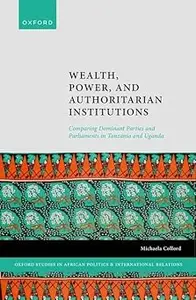- Témaindító
- #1
- Csatlakozás
- 2024.09.10.
- Üzenetek
- 25,854
- Reakció pontszám
- 8
- Díjak
- 5
- Kor
- 37

Free Download Michaela Collord, "Wealth, Power, and Authoritarian Institutions: Comparing Dominant Parties and Parliaments in Tanzania and Uganda "
English | ISBN: 0192855182 | 2024 | 320 pages | PDF | 3 MB
Through an analysis of the recent political history of Tanzania and Uganda, Wealth, Power, and Authoritarian Institutions offers a novel explanation of why authoritarian parties and legislatures vary in strength, and why this variation matters. Michaela Collord elaborates a view of authoritarian political institutions as both reflecting and magnifying elite power dynamics. While there are many sources of elite power, the book centres on material power. It outlines how diverse trajectories of state-led capitalist development engender differing patterns of wealth accumulation and elite contestation across regimes. These differences, in turn, influence institutional landscapes.
Where accumulation is more closely controlled by state and party leaders, as was true in Tanzania until economic liberalization in the 1980s, rival factions remain subdued. Ruling parties can then consolidate relatively strong institutional structures, and parliament remains marginal. Conversely, where a class of private wealth accumulators expands, as occurred in Tanzania after the 1980s and in Uganda after the National Resistance Movement took power in 1986, rival factions can more easily form, simultaneously eroding party institutions and encouraging greater legislative strength.
Collord uses this analysis to reassess the significance of a stronger legislature. She considers its influence on distributive politics, both regressive and progressive. She also considers its relation to democratization, particularly in a context of broader liberalizing reforms. The book ultimately encourages a closer examination of how would-be democratic institutions interact with an underlying power distribution, shaping in whose interests they operate.
Read more
Buy Premium From My Links To Get Resumable Support,Max Speed & Support Me
Code:
⚠
A kód megtekintéséhez jelentkezz be.
Please log in to view the code.
